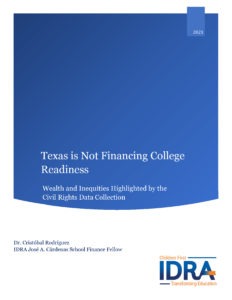IDRA Releases New Study on Inequitable Access to College Prep Math Courses
 (San Antonio • October 28, 2021) Texas policies and funding block students from graduating prepared for college, which includes having access to higher math, like Algebra II and calculus. Dr. Cristóbal Rodríguez, IDRA’s José A. Cárdenas School Finance Fellow, presented his research findings on the relationship between school finance policy and students’ access to college and career readiness in Texas at a virtual symposium last week.
(San Antonio • October 28, 2021) Texas policies and funding block students from graduating prepared for college, which includes having access to higher math, like Algebra II and calculus. Dr. Cristóbal Rodríguez, IDRA’s José A. Cárdenas School Finance Fellow, presented his research findings on the relationship between school finance policy and students’ access to college and career readiness in Texas at a virtual symposium last week.
“Texas boasts about its economic power and its investment in economic development, but it doesn’t ensure that there are high standards for math and science,” said Dr. Rodríguez. “It really does create a double standard when you start seeing there are more affluent, wealthy districts who are providing that access. The current system maintains privilege for some and sustains inequality, setting up some communities to fail.”
Dr. Rodríguez is associate dean of equity, inclusion and community engagement at the Mary Lou Fulton Teachers College of Arizona State University. His study is one of the first to link school funding to college readiness.
While AP courses are a strong indicator of college readiness, the most reported and greatest indicator is completion of algebra in middle school and advanced math in high school. Dr. Rodríguez’s analysis released by IDRA focused on calculus and found that calculus is not equally and fairly accessible in Texas public schools. Wealthier school districts have higher rates of students taking calculus. And school districts with higher proportions of students in families with low incomes have lower rates of students taking calculus.
“This new research pushes the conversation about what equitable access to college readiness really looks like,” said Celina Moreno, J.D., IDRA President & CEO. “What is good for the children of the wealthiest districts in our state must be the expectation we set for all students and that requires strong standards and state investment.”
See the report and the related infographic and watch the symposium video.
The virtual symposium (watch video playback below) gathered education and community leaders along with a panel of experts who reflected on key themes and questions raised by the research. Panelists included Dr. Albert Cortez, retired IDRA Director of Policy and a national authority on school finance; Hon. Dr. Mary E. González, Texas State Representative and associate director for the Partnership for the Future of Learning; Lourdes Flores, executive director of ARISE Support Center that serves families in colonias in South Texas and a parent of three teens; Celina Moreno, J.D.; and Dr. Bricio Vasquez, IDRA education data scientist.
 Texas ranks 40th among U.S. states with just 58% of high school graduates going directly to college in 2018. In fact, 15% of Texas high schools don’t even offer Algebra II, which used to be a required course. But HB 5 in 2013 and the subsequent actions by the Texas State Board of Education changed that. Only about half of Texas high schools offer calculus, and only 3% of high school students take the course.
Texas ranks 40th among U.S. states with just 58% of high school graduates going directly to college in 2018. In fact, 15% of Texas high schools don’t even offer Algebra II, which used to be a required course. But HB 5 in 2013 and the subsequent actions by the Texas State Board of Education changed that. Only about half of Texas high schools offer calculus, and only 3% of high school students take the course.
IDRA outlined a set of recommendations for schools and the state to improve college access.
- All students should have access to college-prep courses, including Algebra II and higher math classes, such as calculus and statistics.
- Schools should not steer any middle school students away from college options. Students need to take Algebra I in eighth grade and be prepared beforehand to be successful.
- The state should take steps to address long-standing teacher shortages in critical fields, such as math, science and bilingual education.
- All 8th-12th grade students should have access to college counselors who can advise them into advanced coursework that meets their college and career goals.
- Schools should practice authentic two-way family engagement so that students and their parents can make informed decisions about their college and career counseling options.
- College readiness indicators for schools should be tied to outcomes and be decoupled from military readiness, which should have its own rigorous standards.
- The state should abolish the endorsement system for graduation requirements and return to the 4×4* plan that colleges prefer (Hinojosa, 2016). In the interim, the state should monitor the college and career outcomes to ensure students have equitable access to college success through any endorsements offered at their high school.
The IDRA José A. Cárdenas School Finance Fellows Program honors the memory of IDRA founder, Dr. José Angel Cárdenas. The goal of the program is to engage the nation’s most promising researchers in investigating school finance solutions that secure equity and excellence for all public school students.
* 4×4 refers to four courses each in math, science, English and social studies.


